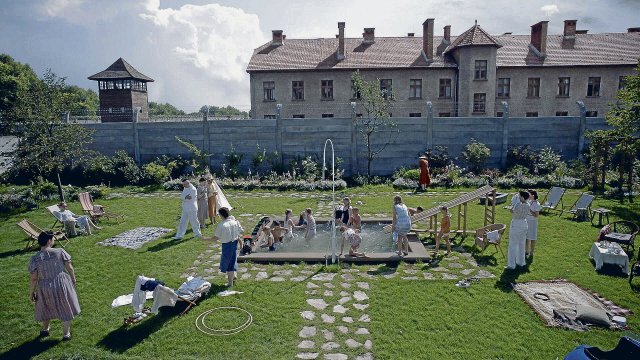Auschwitz is there and you can’t see it: Garden scene of the Höß family in “Zone of Interest”
Foto: Leonine Distribution
It’s unclear whether British director Jonathan Glazer intended it or not: “Zone of Interest,” his new film about Germany’s culture of oblivion, is as relevant as it gets. In a way, this film is ars poetica, art about art: a story about telling a story. The work of art at the center of the film is the total work of art of normal life on the edge of horror, without looking or hearing into the abyss. The family life of Rudolf Höß, the commandant of Auschwitz, is shown without showing any pictures from the camp next to which his home is located.
But the fact that nothing can happen on the verge of terror is itself a terror, and aren’t we constantly on the verge of terror these days? The banality of evil is evil; what happened outside the wall of Auschwitz is an inherent, essential part of the Holocaust. The two sides of the wall make each other possible: by not wanting to know, by normalizing the monstrous so that it fits into the model of a kind of American Dream, the monstrous can actually happen. And because the crematorium continued to smoke, the Höß family – but also every Müller family in Berlin or Stuttgart – was able to fulfill a small dream: to become successful.
It is clear: the Höß family strived for success. Once its members achieved what was socially determined to be success, they were very stolz. Stolz, another German word that plays a role here. The search, which becomes a longing and at some point an addiction, for something to be proud of requires, first of all, conformity to a system that makes it very clear what is success and what is failure, who is a good citizen and who is bad, who can be proud and who has to be ashamed. If you question the system that measures success in the first place, then it will be difficult to reap that success.
The pursuit of success is a completely human trait, but the bourgeoisie’s concept of success has not yet completed its Copernican turn: success in this sense is perceived as natural and fixed and not as politically dynamic. Supposedly there are certain, fixed things that one can do that naturally bring about this success, while requirements for success are actually the subject of political design that the human desire for success knows how to use to its advantage. The auto industry shows how success comes from owning a big expensive car; In capitalism it consists of having money, becoming rich, being able to buy many things. In Nazi Germany, the world was reorganized so that what was perceived as success could – and had to – ignore Germany’s systematic murder factories. The Höß family, like many Germans at the time, was successful according to this definition of success.
Auschwitz was the extreme expression of a murderous fascist anti-Semitic ideology and at the same time a byproduct of the bourgeois striving for a big house with a garden, two blonde children and beautiful nature around it. We have studied, confronted and dealt with the danger of substantial Nazi ideology. But the danger of the bourgeois lifestyle that Hannah Arendt tried to convey to us as the “banality of evil” seems to be what we need a film like “Zone of Interest” for.
nd.DieWoche – our weekly newsletter

With our weekly newsletter nd.DieWoche look at the most important topics of the week and read them Highlights our Saturday edition on Friday. Get your free subscription here.
The French philosopher and cultural scientist Jean Baudrillard wrote in his most famous book “Simulacres et Simulations” that Disneyland exists as an artificial hyperreal world to hide the fact that the rest of the USA is also Disneyland. In this sense, Auschwitz is the Disneyland of the culture of remembrance. You go to Auschwitz to see, feel, smell, like a temple. The green fields of the German villages, the white peaks of the Alps and the quiet beaches of the Baltic Sea also tell this story. The history of the gas chambers and crematoriums is the story of gardens with a German shepherd, of fishing with the children on weekends, of successful men and their proud housewives. How relatively easy it was all these years to just look at Auschwitz without seeing anything outside of Auschwitz. In many ways, the German culture of remembrance is an exact reversal of the reality in the “Zone of Interest”. Perhaps that’s why the film seems to show many people the “perpetrator’s perspective” because we assume our opposite perspective is that of the victims. But memory must also be a memory of perpetration and its normalization; that is the difference between remembering and repression.
I consciously use Auschwitz here as a synecdoche for all concentration camps, ghettos, Holocaust memorials and museums. These places of memory are not only limited spatially, but also temporally. Because the culture of remembrance focuses on places like Auschwitz and not on the gardens with German Shepherds and fishing on the weekend, the blinding mechanism still works. We are currently experiencing perhaps the most documented catastrophe of our time in Gaza. The refusal to look is remarkable. This is not about comparing or equating the Holocaust with current events, but rather about highlighting how the German culture of remembrance perpetuates mechanisms of looking the other way.
On the film poster for “Zone of Interest” you can see the house with the garden and the wall. Behind the wall is a black nothingness. Our culture of memory does exactly what a black nothingness ultimately creates again: it takes the practice of memory and subjects it to the principle of success – you can do it better or worse, not just differently. If that is the case, then Germany – as in fascism, communism, football or reparations – not only wants to be better, but the best. To be the best, to be successful in a culture of remembrance, means again that one cannot doubt the social concept of success.
And because it is a political question of what is successful and what is not, also in the culture of remembrance, a Hubert Aiwanger could have anti-Semitic leaflets in his backpack and continue to be finance minister of Bavaria and even emerge stronger from the subsequent elections. Bavarians can maintain houses with gardens on the former site of the Flossenbürg concentration camp, but an Israeli film director who calls for peace and justice is labeled an anti-Semite. Our conception of memory, of learning from history, of never again is politically influenced. The fact that memory is a political question is not surprising and is not inherently bad. But the fact that we swallow the current concept of memory without a doubt and turn images and videos of bombed or starved children into a black nothing – that is the repetition of an old mechanism.
Hannah Arendt described Adolf Eichmann, who was undoubtedly a “law-abiding citizen,” according to Arendt, as someone whose need for feelings in general disappeared “as the months and years passed.” The Höß couple didn’t need feelings either. The moment of success, however defined, fills a void where passion once existed. In truth, fascism succeeds where people are so boring that they get bored. The passion with which Yuval Abraham and Basel Adra were attacked by politicians and the press at the end of the Berlinale, compared to the indifference with which the horror from Gaza is ignored and becomes a black nothing, should make us all afraid of returning – or just of continuity – of an old mechanism. Elias Canetti once said: “The only person who is truly cowardly is someone who is afraid of their memories.” Everyone should decide for themselves whether a concept of remembering that demands a big black nothing in our understanding of the world suits him or her.
#ndstays – Get active and order a promotional package
Regardless of whether it is pubs, cafés, festivals or other meeting places – we want to become more visible and reach everyone who values independent journalism with an attitude. We have put together a campaign package with stickers, flyers, posters and buttons that you can use to get active and support your newspaper.
To the promotional package
